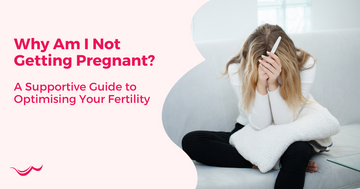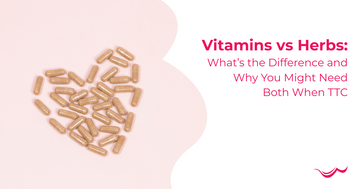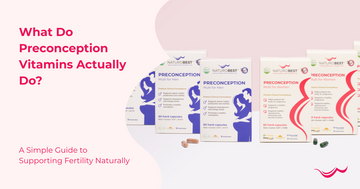Why Am I Not Getting Pregnant? A Supportive Guide to Optimising Your Fertility
by NaturoBest Naturopath Team on Apr 15, 2025

Trying to conceive can be an exciting yet frustrating journey, especially when pregnancy does not happen as quickly as expected. If you’re wondering, “Why am I not getting pregnant?” know that you’re not alone. Many factors can influence fertility, but the good news is that there are proactive steps you can take to enhance your chances of conception.
The Importance of a Healthy Lifestyle for Conception
Your overall health plays a significant role in fertility. A well-balanced lifestyle supports hormonal balance, egg and sperm health, and overall reproductive function. Here are some key areas to focus on:
1. Nutrition and Diet
-
Consume a nutrient-dense diet rich in whole foods, including fresh fruits, vegetables, lean proteins, healthy fats, and complex carbohydrates.
-
Ensure adequate intake of essential nutrients such as folate, vitamin B12, zinc, vitamin D, and omega-3 fatty acids.
-
Eliminate processed foods, caffeine, alcohol, and refined sugars, which may negatively impact fertility.
2. Weight and BMI
-
Being underweight or overweight can disrupt ovulation and hormone balance.
-
Aim for a healthy BMI (between 18.5 and 24.9).
3. Exercise and Physical Activity
-
Engage in regular moderate exercise to support circulation, hormone balance, and stress management.
-
Avoid excessive high-intensity workouts, which may interfere with ovulation.
4. Managing Stress and Emotional Wellbeing
-
Chronic stress can elevate cortisol levels, which may negatively impact reproductive hormones.
-
Incorporate stress-reducing activities such as yoga, meditation, acupuncture, or journaling.
-
Seek emotional support from loved ones, fertility counsellors, or support groups.
Understanding Your Menstrual Cycle and Ovulation
Tracking ovulation is crucial for optimising conception. The most fertile window is the few days leading up to ovulation and the day of ovulation itself.
Ways to Track Ovulation:
-
Basal Body Temperature (BBT): A slight temperature rise after ovulation can indicate your fertile window.
-
Ovulation Predictor Kits (OPKs): These detect the luteinising hormone (LH) surge 36 hours before ovulation.
-
Cervical Mucus Monitoring: Fertile cervical mucus is clear, stretchy, and resembles raw egg white.
-
Cycle Tracking Apps: Apps can help estimate fertile days based on past cycle data. Athough they are not the most reliable method of predicting ovulation, it is important for you to track where you are in your cycle.
The Role of Preconception Care in Fertility
A preconception care plan ensures your body is in the best possible state to support a healthy pregnancy.
Key Aspects of Preconception Care:
-
Prenatal Supplementation: Taking a high-quality preconception vitamin at least three months before conception supports egg health and reduces the risk of nutrient deficiencies. You'll know it's high quality if it contains active B vitamins such as folate as Quatrefolic®, well absorbed minerals like iron bisglycinate as Ferrochel® which doesn't compete against other minerals such as zinc for absorption and includes CoQ10.
-
Hormone Testing: Checking hormone levels can provide insights into ovulatory health, including progesterone 7 days after ovulation, day 2 or 3 oestradiol, LH, FSH, and thyroid function.
-
Semen Analysis: A semen analysis can assess sperm count, motility, and morphology and is a good indicator of general overall health.
-
Underlying Health Conditions: Conditions such as PCOS, endometriosis, thyroid disorders, or autoimmune diseases can impact fertility and should be managed with the help of a healthcare professional.
-
Environmental Factors: Reduce exposure to endocrine-disrupting chemicals (EDCs) found in plastics, pesticides, and some personal care products.
When to Seek Professional Help
If you’ve been trying to conceive for over 12 months (or six months if you’re over 35), consulting a fertility specialist can help identify any underlying issues.
A fertility consultation may include:
-
Blood tests to check hormonal levels
-
Ultrasound scans to assess ovarian reserve and uterine health
-
Fallopian tube assessment (HSG or HyCoSy)
-
Lifestyle and nutrition advice tailored to your specific needs
A Hopeful Path Forward
The journey to parenthood can be challenging, but there is always hope. By focussing on a healthy lifestyle, understanding your cycle, and seeking professional guidance when needed, you are giving yourself the best possible chance of conception. Every step you take towards improving your fertility is a step closer to holding your baby in your arms.
If you are feeling overwhelmed, remember that support is available. Whether through a trusted healthcare provider, fertility specialist, or a supportive community, you are not alone in this journey.
Your Preconception Checklist:
✅ Eat a nutrient-dense, balanced diet
✅ Maintain a healthy weight
✅ Exercise regularly but moderately
✅ Reduce stress through mindfulness and self-care
✅ Track ovulation and identify your fertile window
✅ Start a high-quality pre-pregnancy supplement
✅ Get a hormone and fertility check-up
✅ Minimise exposure to harmful environmental toxins
✅ Seek professional guidance if needed
Taking proactive steps today can lead to a brighter, more hopeful tomorrow. Wishing you a smooth and successful journey to conception.
- boost fertility,
- boosting fertility,
- Category_Fertility/Preconception,
- female fertility,
- preconception,
- preconception care,
- preconception care plan,
- preconception for men,
- preconception health,
- preconception health care,
- preconception health for men,
- preconception health for women,
- preconception health plan,
- preconception vitamins




